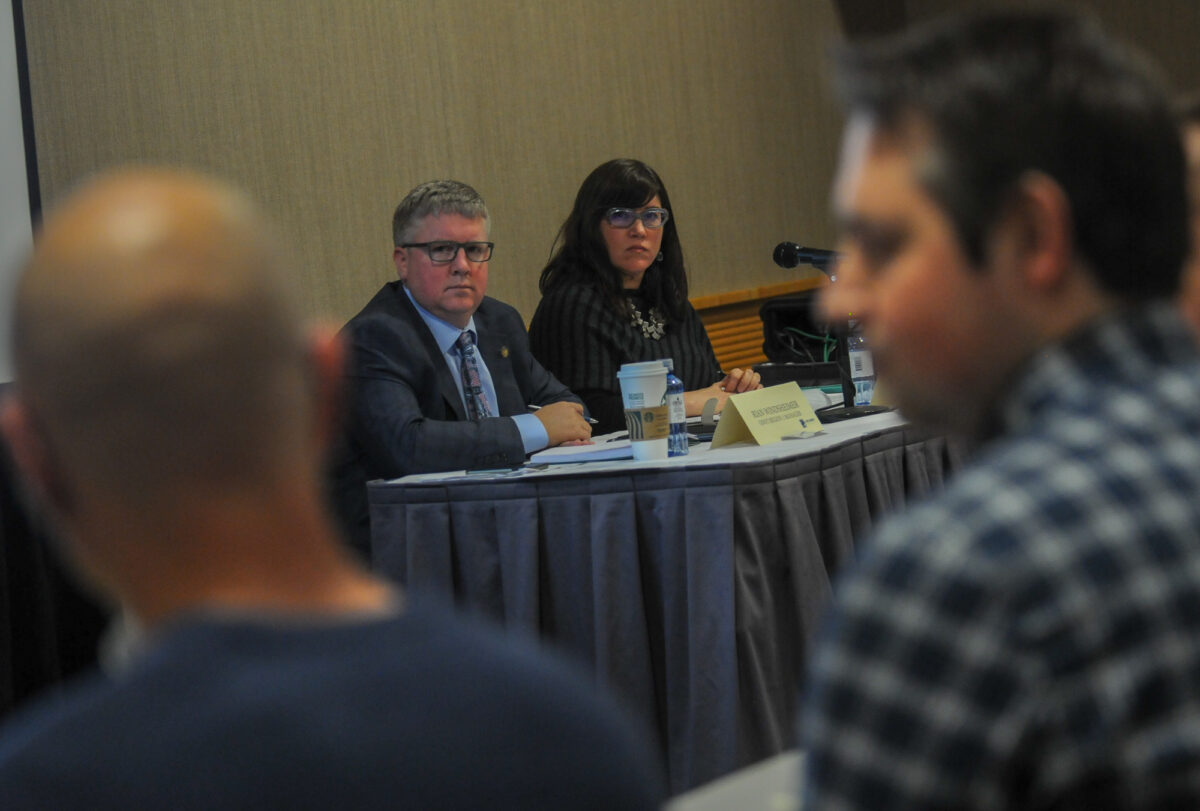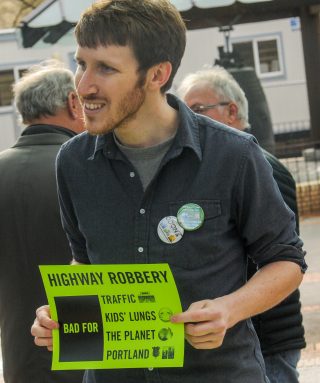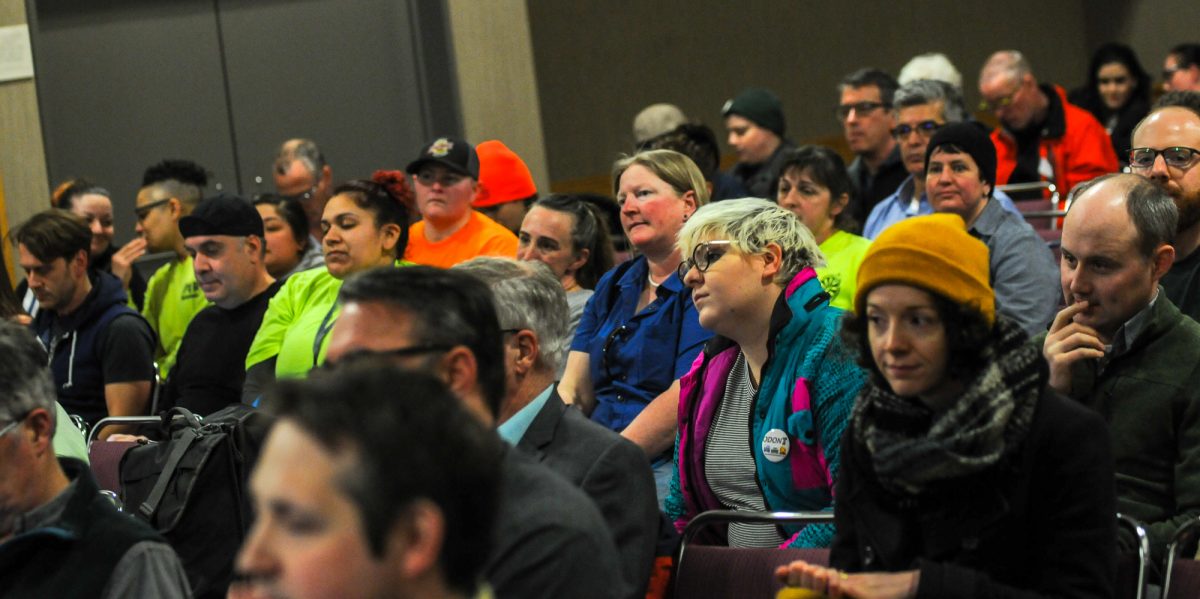
(Photos: Jonathan Maus/BikePortland)
At a public hearing held last night in the Oregon Convention Center, a wide array of Portlanders voiced detailed and passionate opposition to the I-5 Rose Quarter project.
“I don’t necessarily think fixing this poorly designed interchange on I-5 is a terrible idea. We’re not adding capacity at either end of it. We’re trying to clear up a bottleneck right?
— Chloe Eudaly, Commissioner of Transportation
From middle school students to veterans of freeway fights nearly five decades ago, their testimony exposed the myriad significant faults in this project.
People voiced concerns about the health of their children (and future children), the urgent need for investment to stem the carnage on ODOT’s deadly urban highways, the poor design of the freeway lids, the history of institutionalized racism in the original construction of I-5, fears of climate change, the lack of tolling as an option, the inadequacy of proposed bicycling infrastructure, an increase in toxic emissions mere yards away from Harriet Tubman Middle School, induced demand, ODOT’s willful obfuscation and dishonest marketing of the project, and more.
Outside of invited testimony, there were only a couple of people — out of 55 total speakers — who expressed support for the project. There was a large contingent of union reps and workers who think the project will alleviate congestion and provide good-paying jobs. However, several union workers expressed a desire to work with those opposed to the current iteration of the project in hopes of making it better (they really just need something big to build, who says it has to be a wider freeway?).

ODOT Region 1 Director Rian Windsheimer and City of Portland Transportation Commissioner Chloe Eudaly sat in the front of the room as panel after panel of concerned people tore into the project from a myriad of angles.
It was nothing short of a complete evisceration of ODOT’s talking points — at an event that was never on ODOT’s schedule and only happened after Commissioner Eudaly (under pressure from her constituents) requested it.
Many people mentioned how ODOT has failed to include key datasets in the Environmental Assessment (EA) that are needed to understand ODOT’s claims and assumptions about traffic volumes and emissions. After listening to two hours of testimony, Commissioner Eudaly (with ODOT’s Windsheimer sitting right next to her) told the crowd, “You have a right to have that data,” and “If it can’t be released in a timely fashion, I will ask for an extension to the comment period.” Windsheimer responded by saying the data would be made available “in the next day or two.”
With just 19 days left in the comment period, every day matters.
Asking the public to weigh in on such an important project with incomplete information is a “travesty, and it’s very disrespectful to our community,” Portlander Sarah Iannarone said in her testimony.
Iannarone also lamented how it seems we, as Portlanders, have “Lost our way” when it comes to leadership on transportation. Then, like many other people throughout the night, she appealed directly to Commissioner Eudaly. “I know that you have courage. I know you have vision. We will have your back if you stand with us on this.” “And to ODOT,” Iannarone concluded, “It’s just not going to happen. We’ll lie down on that highway before you ever build this.”
Advertisement

In a lighter moment, St. Johns resident Paul Rippey stood up with his guitar and sang his clever “Induced Demand” tune while many people in the crowd joined him in the chorus: “And the thing we need to understand is, induced demand,” they sang. (We profiled Rippey and shared the lyrics to his song back in May.)
“Black lives matter, black students matter, and black lungs matter.”
— Bryan Chu, teacher at Tubman Middle School
The legacy of past freeway fights in Portland was also a strong thread last night. I counted at least three people who testified and were around and/or a part of stopping the Mt. Hood Freeway and other highway mega-projects of the past. Grant Sawyer from southeast Portland was one of them. He mentioned that during the Mt. Hood Freeway fight, activists and political leaders were able to get highway funds earmarked for the freeway project transferred to other, non-highway uses (like MAX light rail).
“Have you seen the icebergs? They’re melting. They’re melting quickly,” Sawyer said, as his voice rose in volume. “We don’t have time to screw around! To invest any money that enhances fossil fuel use is absolutely insane! Excuse my anger. But I’m pissed!”
His comments about funding prompted a response from Commissioner Eudaly, who said, “This isn’t a PBOT project, this is an ODOT project. This money is from the Highway Trust Fund. As much as I’d like to spend half a billion dollars elsewhere. It’s not my money, and it can only be spent on highways. We can’t take this money and spend it on Vision Zero city streets. It’s ODOT’s money to spend on ODOT’s highways.”
To which Sawyer replied, “That’s what the feds told us in 1975! But we did it!”
Its clear those who oppose this project see Eudaly as a potential ally who might be willing to join fellow Commissioner Jo Ann Hardesty as the second City Council vote against the project. Eudaly has walked a fine line thus far, expressing support for the idea of relieving Rose Quarter congestion and a willingness to partner with ODOT to do it, while also sending signals that she remains uncomfortable with the current plans.
Many testifiers said ODOT should spend this money on deadly streets like 82nd instead of on I-5 where there is no record of deadly or serious injury crashes. During his comments, RJ Sheperd asked everyone to take a moment of silence for Juanita Francisco, the high school student who was hit and nearly killed on February 24th while trying to cross NE 82nd Avenue.
That moment stuck with Eudaly. In her closing remarks she thanked Sheperd for recognizing Francisco and then shared a personal story. “I’m someone who knows what it’s like to lose someone in a traffic crash,” she said. “To live with the knowledge that not only my father, but the two people he killed when he lost control of his vehicle, likely wouldn’t have died if that road had not been so poorly engineered. That is something I feel every time I hear about a serious injury or death on our streets.”
The urgency of the ever-present danger on ODOT-owned arterials was on the mind of northeast Portland resident Clint Culpepper. “If ODOT was truly concerned about safety, they’d spend this money on projects that would save lives tomorrow.”
Children will bear the brunt of decisions made today and many people stood up last night to defend their futures — including a few of the students themselves.
One young student read the definitions of environmental and social justice and then said, “I can see the freeway outside my building. I can also see the thick grey exhaust and that’s scary to think my friends and I are breathing that when we’re running around… If ODOT were to expand the freeway, that would be much worse.”
Bryan Chu teaches eighth graders at Tubman Middle School. He did not mince words in expressing deep concerns about new freeway lanes being built even closer to his classroom.
“PPS [Portland Public Schools] and the Oregon Department of Transportation seem to be highly efficient at perpetuating white supremacy, environmental racism, and placing profit over people and planet while claiming to have our best interests at heart,” Chu said. “But we know better.” Chu added that his students know they’re being lied to when they’re told the air is safe to breathe but see the $10 million HVAC filtration system that sits atop the school’s roof. “They understand we are a frontline community and we are always the ones made to pay the price for Portland’s progress,” he added. He then put a fine point on how he feels racism intersects with this project. “Black lives matter, black students matter, and black lungs matter.”
In her closing remarks, Commissioner Eudaly was measured in her tone. “I feel your desperation about climate change and about air pollution,” she said, before telling the crowd she has always tried to avoid living next to freeways, but, “It’s really hard to escape them.”
The commissioner then said she’d, “Throw Rian [Windsheimer of ODOT] a bone,” and laid out her most detailed comments on the project yet:
“I don’t necessarily think fixing this poorly designed interchange on I-5 is a terrible idea. We’re not adding capacity at either end of it. We’re trying to clear up a bottleneck right? I don’t think we can’t devote any resources to improvements like that. But I do believe we have to make it harder and harder for people to rely on their single-occupancy vehicles while increasing bicycle infrastructure, pedestrian infrastructure, and greatly improving our public transit system. That’s not to say I’m absolutely gung-ho about this. I’m just saying I don’t see it the same way that everyone sees it in this room.”
Then, after reiterating her belief that project funds can’t be switched to different projects, she ended with, “I’m not going to walk away from this conversation. And I hope none of you walk away. I’m convinced we can come up w something better that will better serve our whole community.”
——
Last night was amazing. There were many compelling and substantive comments made from a wide range of people. I recorded all of it (except for a minute or two) and will use them in future stories as needed. You can read more from the hearing in my live twitter thread here.
— Jonathan Maus: (503) 706-8804, @jonathan_maus on Twitter and jonathan@bikeportland.org
Never miss a story. Sign-up for the daily BP Headlines email.
BikePortland needs your support.

